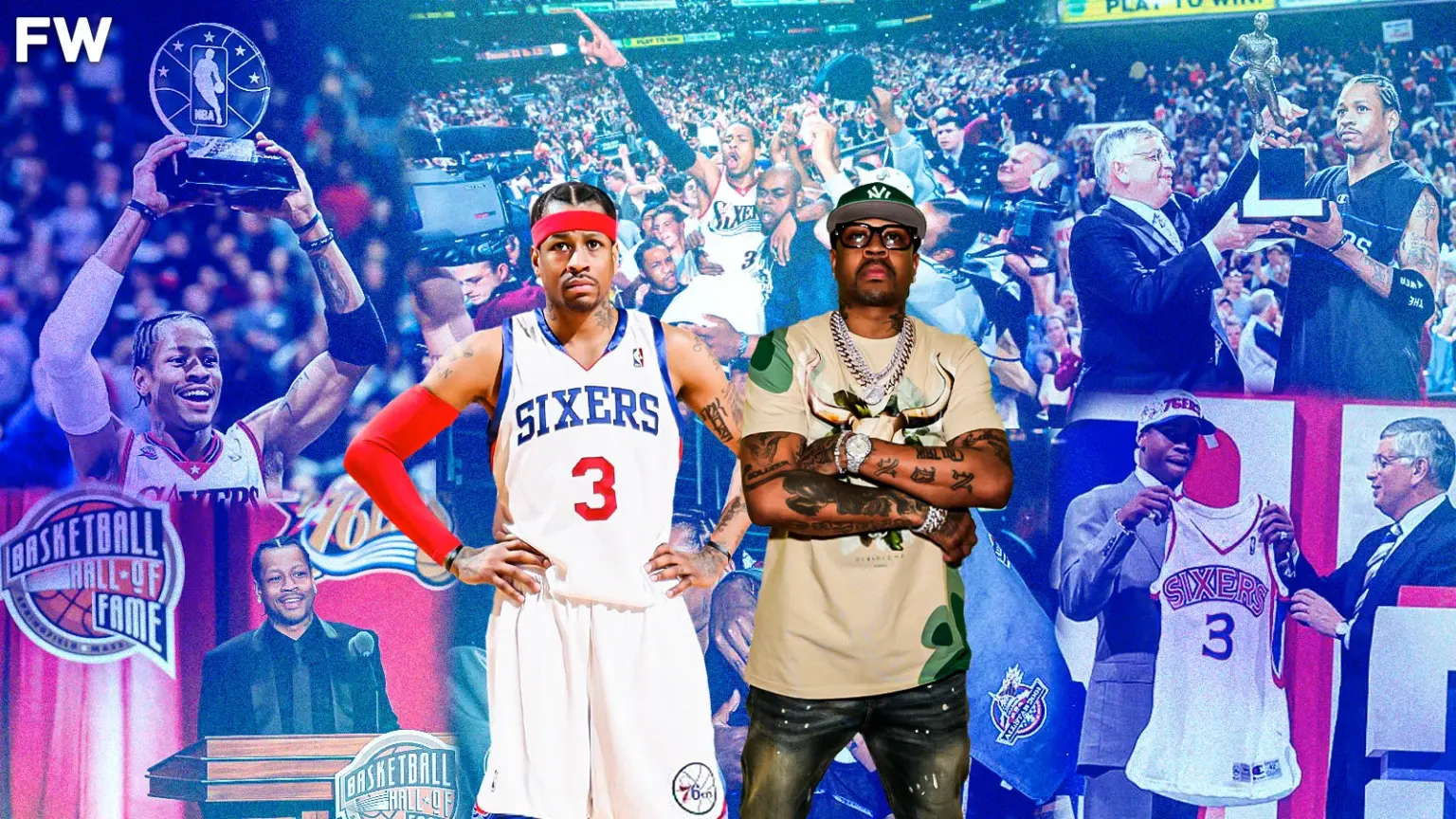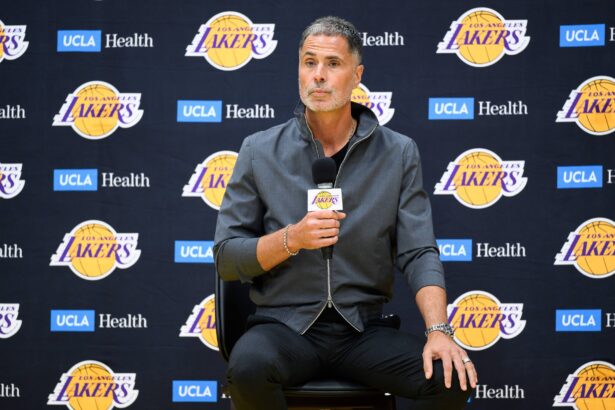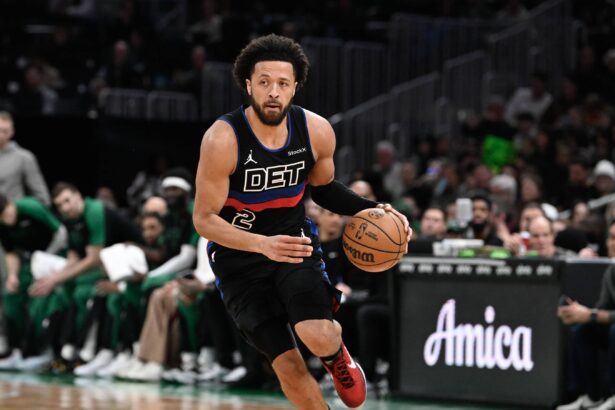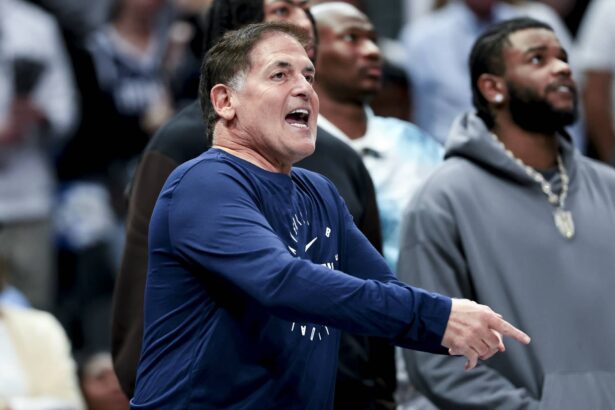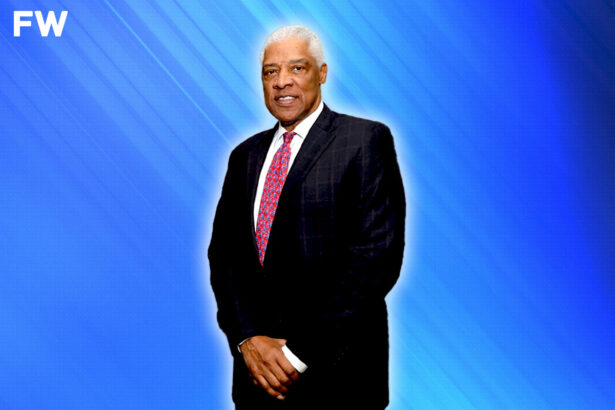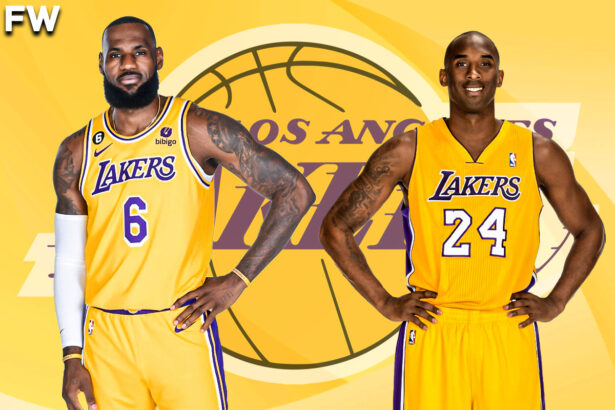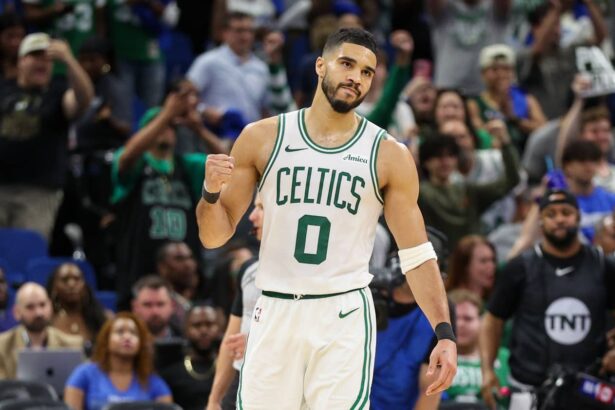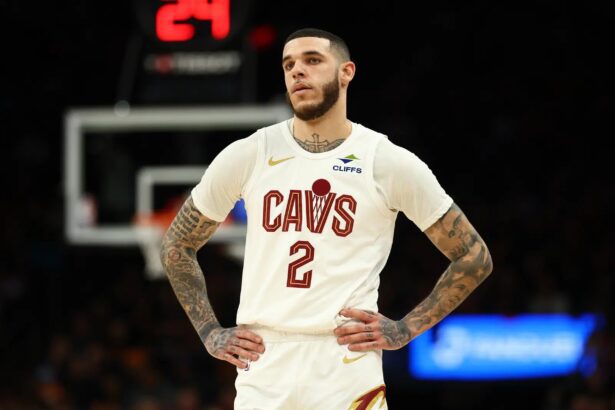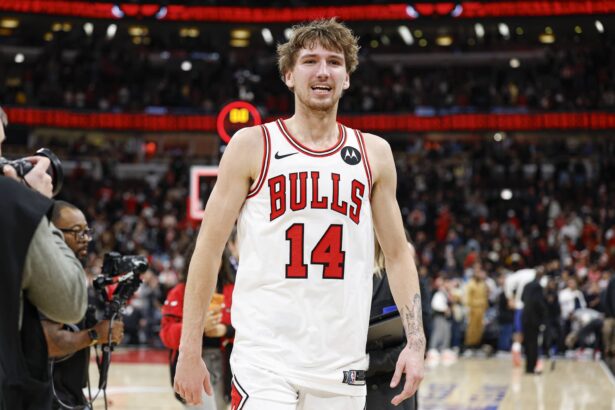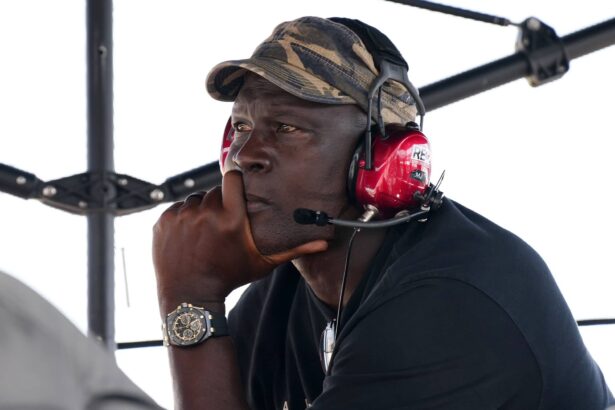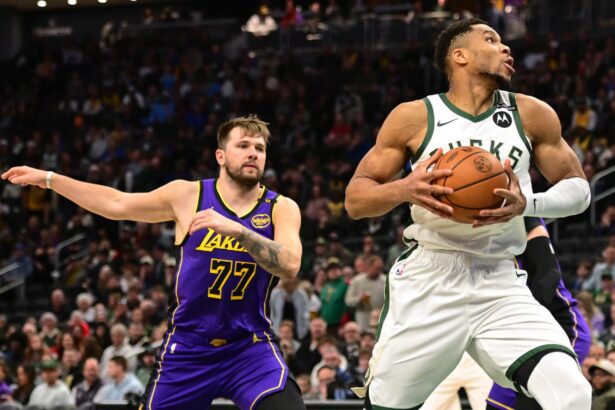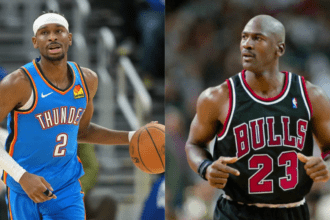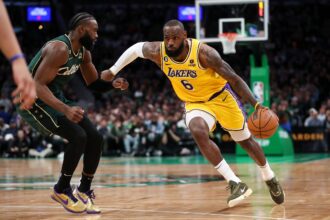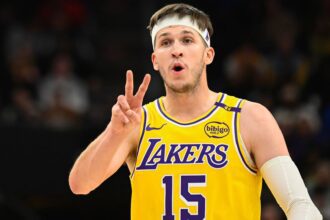- Allen Iverson is an 11-time NBA All-Star, a four-time scoring champion, a two-time All-Star Game MVP, and the NBA’s 2001 MVP
- Iverson grew up in an impoverished area, in a single-parent household, raised by his mother, Ann Iverson
- Iverson was inducted into the Naismith Memorial Basketball Hall of Fame, in 2016
The story of Allen Iverson is one of the most inspiring stories in sports history. Born and raised in the rough and tumble streets of Virginia, Iverson faced countless obstacles and challenges throughout his life.
- Iverson: His Early Years
- Iverson Changes The NBA Culture
- Next
- LeBron James: The Biography Of The NBA’s King
- The Biography Of The G.O.A.T.: Michael Jordan
- Magic Johnson Biography: How The NBA’s Greatest Passer Defeated A Deadly Illness To Become A Successful Businessman
- Kareem Abdul-Jabbar: The Biography Of An NBA Champion, Civil Rights Activist, And The Master Of The Unstoppable Sky-Hook
- Bill Russell: The Greatest Winner In NBA History
But through hard work, dedication, and an unwavering commitment to his dreams, Iverson overcame the odds and became one of the greatest basketball players of all time.
In this article, we will dive deep into Iverson’s journey, from his troubled youth to his incredible success on the court. We’ll explore the defining moments of his career, his personal struggles, and his rise to the top of the basketball world.
So, whether you’re a die-hard Iverson fan or just love a great underdog story, join us as we take a journey through the life of one of basketball’s most beloved and iconic players.
This is the biography of “The Answer” Allen Iverson.
Iverson: His Early Years
Allen Iverson was born on June 7, 1975, in Hampton, Virginia. Iverson grew up in a tough neighborhood known for its high crime rates and poverty. From a young age, Iverson faced adversity that would shape his character and fuel his determination.
Growing up in a single-parent household, he was raised by his mother, Ann Iverson, who was only 15 years old when she gave birth to Allen. The family didn’t have a lot of money, but despite limited resources, Ann instilled in her son the values of hard work, perseverance, and the importance of education.
However, the challenges Iverson faced extended beyond the confines of his home. As a young African American boy in an area plagued by racial tensions, he experienced firsthand the harsh realities of discrimination and prejudice. These experiences only served to strengthen his resolve and drive to succeed.
Iverson’s love for sports became his escape from the hardships of his surroundings. Surprisingly enough, Iverson didn’t care much for basketball at first. His first love was football.
“I hated basketball. I thought it was soft,” Iverson explained. “I was always a football player. One day, my mom said, ‘You’re going to basketball practice’. I was like, ‘Playing basketball is soft.’ I thank my mom. If she didn’t tell me I was going to basketball practice that day, I would have never played.”
Iverson played football; this was what he wanted to do in life, become a professional football player. This was a possibility, as Iverson was a highly-ranked high school quarterback.
In fact, Iverson was ranked higher than legendary NFL quarterback Peyton Manning in the high school class of 1995. Of course, Iverson would eventually give basketball a chance, and once he did, Iverson realized he could dominate both football and basketball.
One of the main reasons Iverson gave the game of basketball a try was because of Michael Freeman, who gave Iverson the confidence to be great on a basketball court. Freeman was a family friend and a father figure to Iverson.
Freeman taught Iverson to be tough, something Iverson showcased in every game during his NBA career. Larry Platt, author of Iverson’s biography, Only the Strong Survive, wrote about Freeman’s influence on Iverson’s basketball mentality:
“Allen’s de facto father, Michael Freeman, known as “House Mouse,” on the streets, would take a ten-year-old Bubbachuck to the courts at Anderson Park and knock him around, one-on-one. ‘Get yer a*s up,’ the five-foot six-inch Freeman would growl every time Allen would hit the asphalt.”
Freeman was what Iverson needed in his life after growing up without a father. This was what made Freeman’s arrest hard to swallow for Iverson. When Iverson was 13, Freeman was arrested in front of him for selling drugs.
Crime was all around Iverson, and even though he tried to stay away from it as he played basketball and football at Bethel High School, it was inevitable that Iverson would have a run-in with the law. This would happen on February 14th, 1993, just as a bunch of colleges were taking notice of his skills.
Iverson and a group of friends were at a bowling alley when they got into a huge brawl with a group of white men. During the brawl, Iverson allegedly hit a woman in the head with a chair. This led to Iverson being arrested.
At the time of the arrest, Iverson was 17 years old, but he was charged and later convicted as an adult. This placed Iverson’s future in basketball in jeopardy.
Iverson was convicted on a felony charge of “maiming-by-mob” and was given a 15-year prison sentence, with 10 years suspended. He spent four months behind bars before Virginia Governor Douglas Wilder granted him a pardon. In 1995, the Virginia Court of Appeals overturned the conviction, citing insufficient evidence of his guilt.
“I had to use the whole jail situation as something positive,” Iverson said. “Going to jail, someone sees something weak in you, they’ll exploit it. I never showed any weakness. I just kept going strong until I came out.”
While Iverson was in prison, his mother visited Georgetown basketball coach John Thompson. This led to Thompson visiting Iverson, and Thompson tried to show Iverson he had value in life and on the basketball court.
Thompson wanted Iverson to straighten up, and if he did, Iverson would have a Georgetown jersey waiting for him. After high school, Iverson attended Georgetown University on a full scholarship.
There, Iverson would emerge as a star right away, being named Big East Rookie of the Year after averaging 20.4 points, 3.3 rebounds, 4.5 assists, and 3.0 steals per game.
Iverson played two years at Georgetown, leading them to a Sweet 16 appearance in the NCAA tournament as a freshman and a Big East championship, as well as an appearance in the Elite Eight as a sophomore. Yes, Iverson became the most talked about college basketball player in the nation.
After his two years, putting up averages of 23.0 points per game, as well as winning the Big East Defensive Player of the Year in both of his seasons at Georgetown, Iverson declared for the 1996 NBA Draft.
Iverson Changes The NBA Culture
The Philadelphia 76ers chose Iverson with the first pick in the NBA Draft, and Iverson immediately made Philly fans understand that their franchise made the right choice. Iverson’s flashy crossovers, acrobatic layups, and fearless drives to the basket left defenders in awe and spectators on the edge of their seats.
It wasn’t just his scoring ability that stood out, but also his tenacity on defense. Iverson was relentless in his pursuit of steals and his ability to disrupt passing lanes. But Iverson’s impact on the 76ers went beyond his on-court performance.
He injected a renewed sense of energy and hope into a franchise that had been struggling. His dynamic playing style and sheer determination inspired his teammates to elevate their games, and together they formed a formidable force in the Eastern Conference.
During his rookie season, Iverson averaged an impressive 23.5 points per game, earning him the Rookie of the Year award. His impact was felt not only in the stat sheet but also in the stands, as attendance at 76ers games soared. “The Answer” quickly became a fan favorite, with his jersey becoming one of the league’s top sellers.
Over the next couple of years, Iverson’s impact was felt tremendously throughout the league, and it had nothing to do with his play on the court. It was off the court where Iverson’s influence was just as significant or even larger.
His unique style, complete with cornrows, tattoos, and baggy clothing, challenged traditional norms and resonated with a generation of fans who saw themselves in his rebellious spirit. Iverson’s authenticity and unapologetic self-expression made him a cultural icon, transcending the boundaries of basketball.
Iverson’s popularity reached an all-time high during the 2000-01 season, when “The Answer” not only won his second scoring title after averaging 31.1 points per game, but he also won the MVP Award. The 76ers finished with the best record in the Eastern Conference at 56-26.
Iverson would continue his stellar play in the playoffs, raising his game to the next level. In Game 2 of the First Round vs. the Indiana Pacers, Iverson scored 45 points on 15-27 shooting while adding 9 assists in the 76ers’ 116-98 victory.
In Game 2 of the Eastern Conference Semifinals, this time against the Toronto Raptors, Iverson continued to elevate his game by scoring 54 points in Philadelphia’s 97-92 victory.
https://www.youtube.com/watch?v=hvBJtvy17aI
Game 2 would not be the only 50-point game from Iverson in the series. He also scored 52 points on 21-32 shooting in the 76ers’ 121-88 Game 5 victory.
Iverson scored 46 points in Game 6 of the Eastern Conference Finals vs. the Milwaukee Bucks and 44 points in Game 7 of the same series to help give his 76ers a 108-91 victory and a 4-3 series win. Iverson did the unthinkable, he led his 76ers to the NBA Finals in a matchup with the powerful Los Angeles Lakers.
Despite facing the formidable Lakers, who were led by Kobe Bryant and Shaquille O’Neal, Iverson’s sheer determination and unmatched skill propelled the 76ers to an unforgettable 107-101 overtime Game 1 victory. In that game, Iverson scored 48 points on 18-41 shooting.
The best moment from the game occurred with less than a minute left in overtime. Iverson hit Tyronn Lue with a crossover and famously stepped over him as he made his way back down the court.
The 76ers might have lost the series 1-4 to the Lakers, but there was no doubting who was the most explosive player in the NBA. Iverson averaged 35.6 points on 40.7% shooting, 5.6 rebounds, 3.8 assists, and 1.8 steals per game in the 2001 NBA Finals.
After Iverson’s iconic 2000-01 season, things would go downhill for the 76ers star. First, on May 7, 2002, Iverson was upset about people questioning his willingness to participate in practice, including his head coach Larry Brown.
“We sitting in here — I’m supposed to be the franchise player, and we in here talking about practice,” Iverson said. “I mean, listen: We talking about practice. Not a game. Not a game. Not a game. We talking about practice. Not a game. Not the game that I go out there and die for and play every game like it’s my last. Not the game. We talking about practice, man.”
What gets lost in this whole “rant” by Iverson is the deeper meaning behind his blowout on the media. Iverson’s best friend was murdered in a shooting seven months prior to his famous press conference.
This, along with the stress of being a young superstar in the NBA, weighed on him and eventually burst for all to see and, unfortunately, make fun of. For Iverson, though, this wasn’t the only drama he was caught up in.
Iverson was famously tormented by then NBA commissioner David Stern on how he dressed and the “hip-hop” culture Iverson seemingly single-handedly brought into the league. Stern reportedly wanted to end Iverson’s popularity.
This is especially true after Iverson recorded a rap song titled 40 Bars. Stern immediately forced Iverson to change some of the lyrics, as he felt the song didn’t represent the NBA.
The biggest thing Stern attacked Iverson on was his style of clothes. The baggy shirts and pants, to go along with the large chains Iverson wore, were disliked by Stern.
By 2005, Stern enforced a new dress code to combat this. Stern wanted his players to wear suits to look more businesslike, and it was mainly because of how Iverson looked.
Iverson’s career also faded away after his incredible MVP season. Yes, he had some good years, like averaging a career-high 33.0 points per game during the 2005-06 season.
Still, Iverson would never get his team back to the NBA Finals, and after being traded to the Denver Nuggets during the middle of the 2006-07 season, you could tell things would never be the same. Iverson would play three seasons in Denver before bouncing around to the Detroit Pistons and Memphis Grizzlies.
Iverson would end his career back in Philadelphia during the 2009-10 season. He played 25 games for the 76ers and averaged 13.9 points per game.
Iverson attempted to keep his NBA career going, but no team would sign him. After playing just 10 games in 2010–11 as a member of Beşiktaş, a team in the Turkish Super League, Iverson returned to the United States for calf surgery, ending his career for good.
Iverson officially announced his retirement from basketball on October 30, 2013. This was the end of one of the brightest stars the NBA has ever seen.
For his NBA career, Iverson was an 11-time NBA All-Star, a four-time scoring champion, a two-time All-Star Game MVP, and of course, he won the NBA’s MVP award in 2001. Iverson finished his career with averages of 26.7 points, 3.7 rebounds, 6.2 assists, and 2.2 steals per game.
The greatest honor for Iverson happened in 2016 when he was inducted into the Naismith Memorial Basketball Hall of Fame. Iverson gave one of the greatest speeches we’ve seen for a Hall of Fame inductee, famously thanking Michael Jordan for inspiring him.
“You want to be fast like Isaiah and you want to shoot like Bird. Rebound like Barkley. Pass like Magic. Be dominant like Shaq. But man, I wanted to be like Mike,” Iverson said. “I remember the first time I played against him and I walked out on the court and I looked at him and for the first time in my life, a human being didn’t look real to me.
“I don’t know if y’all watched The Chappelle Show, but he talk about a certain incident where he seen somebody seeing Rick James. And I literally seen his aura. It looked like he was gone and I’m sitting there and I’m saying to myself, like, “Man, that’s Mike.” And I’m looking at him. I can’t stop looking at him. I’m looking at his shoes and I’m like, ‘Man, he got on the Jordans.’ I mean, it was Mike. He was my idol. He was my hero.”
Standing at just 6’0″, Iverson defied the odds and revolutionized the game with his fearless style of play, inspiring a generation of players who came after him. Beyond the statistics and awards, Iverson’s impact went far beyond the basketball court.
He brought a unique swagger and authenticity to the game, capturing the hearts of fans worldwide. His trademark cornrows, tattoos, and baggy shorts became synonymous with his rebellious persona, making him a cultural icon and one of the most recognizable figures in sports.
As we reflect on Allen Iverson’s NBA career, it is impossible to ignore the indelible mark he left on the game. From his electrifying performances to his unapologetic authenticity, Iverson’s journey serves as a testament to the power of perseverance, raw talent, and the ability to transcend the sport.
As Iverson continues to make his mark in the next chapter of his life, his legacy as one of the greatest players in NBA history remains firmly intact.
We sincerely appreciate and respect you as a reader of our site. It would help us a lot if you follow us on Google News because of the latest update.
Thanks for following us. We really appreciate your support.

